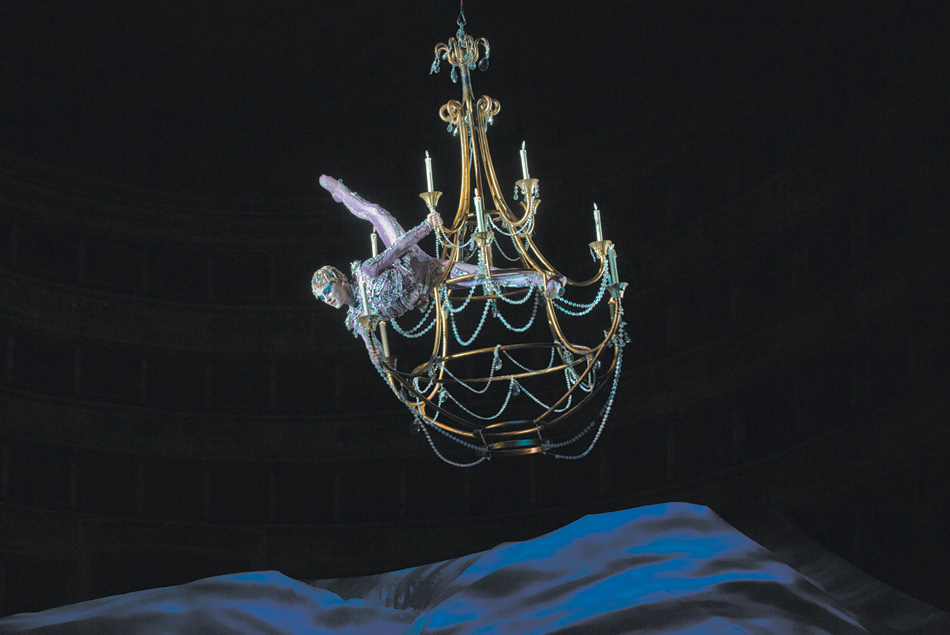Just two evenings—although it now seems longer ago—before the storm that devastated New York and provoked fresh awareness of what it actually is like to live on an island, I was contemplating an imaginary island and a storm made of lighting effects, swirling fabric, and bars of music on the stage of the Met, the opening moments of Thomas Adès’s opera The Tempest. It was certainly a rare occasion—when was the last time the Met presented a contemporary opera with the composer conducting? The work has attracted wide international attention since its Covent Garden premiere in 2004, but this is its first New York appearance. I had not heard a note of the score until the previous evening, when cast members and Met orchestra members participated with Adès in a brief recital at Le Poisson Rouge, the classically oriented music club in Greenwich Village, mixing two brief excerpts from the opera with other Tempest-related material by Purcell, Stravinsky, Tippett, Ives, and Sibelius, a program involving among other things no less than five settings of Ariel’s song “Full fathom five.”
Of these the most disconcerting was without doubt Adès’s, written in a line that careened from one end to another of a high soprano register straining the limits of the human voice, although Laure Meloy survived it. (On stage, the role of Ariel, as sung by Audrey Luna, became the galvanizing force of the production.) Placed immediately following the Purcell, it seemed designed to dispel any notion that this Tempest would offer a feast of airy island melody of the sort that in Ferdinand’s words “crept by me upon the waters,/Allaying both their fury and my passion/With its sweet air.” This Ariel evidently inhabited an air closer to the edge of the ozone layer, exercising not so much enchantment as paralyzing unearthliness. Later in the program Simon Keenlyside—who originated the role of Prospero in 2004 and is repeating it at the Met—established instant authority as he sang the very brief passage setting librettist Meredith Oakes’s compacted version of the famous fourth-act speech:
Our revels are ended
Why do you stare?
He’s melted into air
So cities will perish
Palaces vanish
The globe itself
Dissolve
Nothing stay
All will fade
These are two of the most powerful moments in the score, but they needed the full opera for their weight to be felt. In Thomas Adès: Full of Noises, an absorbing book of interviews with the critic Tom Service, Adès has described opera as “a sort of fate that the characters are going to be subjected to,” and it’s evident he means a sonic fate, the consequences of a musical logic.* The spells at work on Prospero’s island are effected by sounds, and any resolution of the conflicts represented on stage can only be brought about through music. It is the triumph of the work that after an attentive subjection to its sound structures, a dramatic transformation is, at the very end, made audible: a deep shift beyond character or plot, producing a long-lingering inward echo after it’s over.
The words have their part to play in this, but it’s a curious part. Shakespeare’s Tempest is itself a kind of opera, the most virtuosic intermeshing imaginable of radically different verbal textures and modes, whether Ariel’s songs, Caliban’s curses and laments, Ferdinand and Miranda’s love duets, the drunken ribaldry of Stefano and Trinculo, the insolent wit of Antonio and Sebastian, or Prospero’s magisterial arias, all of that mixture permeated by the continual reiterated evocation of “sounds and sweet airs that give delight and hurt not.” The songs aside, none of this really asked to be set to music—it was already its own music—and Adès has not done so: “I don’t take famous speeches from Shakespeare and put a pretty tune to it.” Such a setting, he adds, would amount to “half-timbered, mock Tudor”—he appears to have in mind the approach taken by Benjamin Britten in parts of his Midsummer Night’s Dream (1960).
The text he has set—Meredith Oakes’s abbreviated and freely reworked three-act adaptation—is about as far as one can get from the sonorities of the play. At times it seems an imagination of Shakespeare rewritten by, say, the Ancient Gower of Pericles into a doggerel of short lines, rhymed and half-rhymed, with heavy beats defined by strings of monosyllables—and then translated into some nearly brutalist form of Basic English carefully avoiding any trace of lyricism or ornamentation. It is hard to imagine reading it for pleasure in isolation from the music, but in performance its baldness does have the effect of clarifying the situation at every moment. There is never any cause to be puzzled by what is going on, since every statement—Miranda’s “I never knew/A man could look like you” or Caliban’s “Help me regain my land/I’ll be your friend”—clarifies it beyond ambiguity.
Advertisement
Thus Shakespeare in one sense is gotten out of the way from the start. There will be no question of embellishment of familiar beauties or of period flavor—even if, at the same time, the libretto constantly dangles fragmented echoes of the original language, tracing the shape of what is no longer quite there. It’s as if Adès has chosen to take the music out of Shakespeare’s play in order to substitute his own—a music of no particular place or period, and whose notes seem to dart upward or downward with an unpredictable questing movement, moving where least expected, hovering at unresolved angles. In his book of interviews Adès envisions music as a perpetual search for an impossible stability—“where there is life, there is no stability”—that can aspire at best to “a sort of captured, eternal volatility.” His Tempest is the description of just such an unstable environment, a music not “at home” anywhere because none of those here, variously exiled, shipwrecked, or enslaved as they are, can call the island home, save for Miranda, who has known nothing else.
The island is not a fixed place at all but a theater of transformations. Where Adès has come closest to the essence of the play is in this mood of mutability, of elements subject to recombination and transmutation, of a universal alchemical malleability. That notes in juxtaposition change one another’s identities—that tones are not fixed but in a constant space of readjustment and repositioning—here these are not abstract notions but effective dramatic events. What we see is no more than a further elaboration of what we hear; the same of course could be said of Shakespeare’s Tempest.
From Prospero—no wise magus but a vengeful, almost Ahab-like figure, in this production elaborately tattooed to evoke the archaic magic practices of some oceanic culture—emanates a music crafted from spells, as if distilled, in part, from those stratospheric vibrations of which Ariel’s songs are constructed. The changes of what Prospero sings, and of the orchestral music that appears to obey his will, probe into more arcane corners and weave more encompassing patterns than the more constricted, old-world music of the shipwrecked Neapolitans and Milanese (there is a whole chorus of them) who seek to reestablish their courtly world on the island. The most lyrical voice that emerges is Caliban’s, who comes closest to suggesting a lost beauty from the island’s early history, before the advent of Prospero—something like a memory of earlier English music, as when in the second-act aria “Friends don’t fear” he soars above the swirling string section in a brief unsustainable moment of Purcellian splendor.
Dreamy, lulling music is in scant supply. This is a magic of sharp turns and steep ascents, of dangerous currents and frustrated uncertainties. In paring down The Tempest Adès and Oakes have exposed it as a play in which very little actually happens: a group of people are held, unknowing, in the grip of a spell where an avenger can observe and sometimes torment them, before finally acknowledging that even in victory he has lost: “My life’s work,” Prospero announces, “is nothingness.” (Curiously, Adès’s next opera project centers on a similarly stranded group, the mysteriously immobilized dinner guests of Luis Buñuel’s The Exterminating Angel.)
Prospero’s renunciation of his revenge on the Milanese and Neapolitans signals a transformation in the music, as if one system of magic had switched off and we were suddenly able to hear other sounds as well. A quintet sung by Prospero, Miranda, Ferdinand, Gonzalo, and the King of Naples marks the change with a solemn quietness that has been absent to this point, and then the stage action becomes a series of farewells and exits, the diminished Prospero taking his leave last of all.
Throughout, Robert Lepage’s production design accentuates the notion of an opera within an opera with its central conceit that Prospero’s magical cell is a model of La Scala, within which we move from one vantage point to another: we stand behind the footlights with Prospero and Miranda in the wake of the tempest, look down from the scaffolding with Ariel, stumble about in the wings with Trinculo and Caliban. Only when we first find ourselves among the shipwrecked courtiers—the captive audience for Prospero’s stage production—are we properly “on stage,” with the characters flanked by painted backdrops and the members of the chorus standing about in the awkward fashion of an overpopulated operetta. The marriage masque performed by Iris, Ceres, and Juno in the fourth act of Shakespeare’s Tempest becomes, in the opera, a camera obscura–like projection of silhouettes by Ariel. Nothing is ever so solid that it cannot suddenly disappear.
Advertisement
Then comes an epilogue that has no equivalent in Shakespeare: a bewildered Caliban finds himself again alone on the island, asking himself a series of questions: “Who was here?/Have they disappeared?/Were there others?/Were we brothers?” As the offstage voice of Ariel, now restored to the elements, responds in a repeated triad of syllables, Caliban concludes: “I was dreaming.” In the gaping void that is left after Prospero’s stage tricks are ended, we are on a strip of abstract beach, a beach made of nothing but noise. It’s as if the whole opera had been conceived to leave behind—conjoined with the image of the last islander alone at last on his island—the haunting and ineradicable echo of Ariel’s final vocal line. In the end the only magic resides in the intervals between sounds.
This Issue
December 6, 2012
-
*
Thomas Adès and Tom Service, Thomas Adès: Full of Noises: Conversations with Tom Service (Farrar, Straus and Giroux, 2012). ↩



